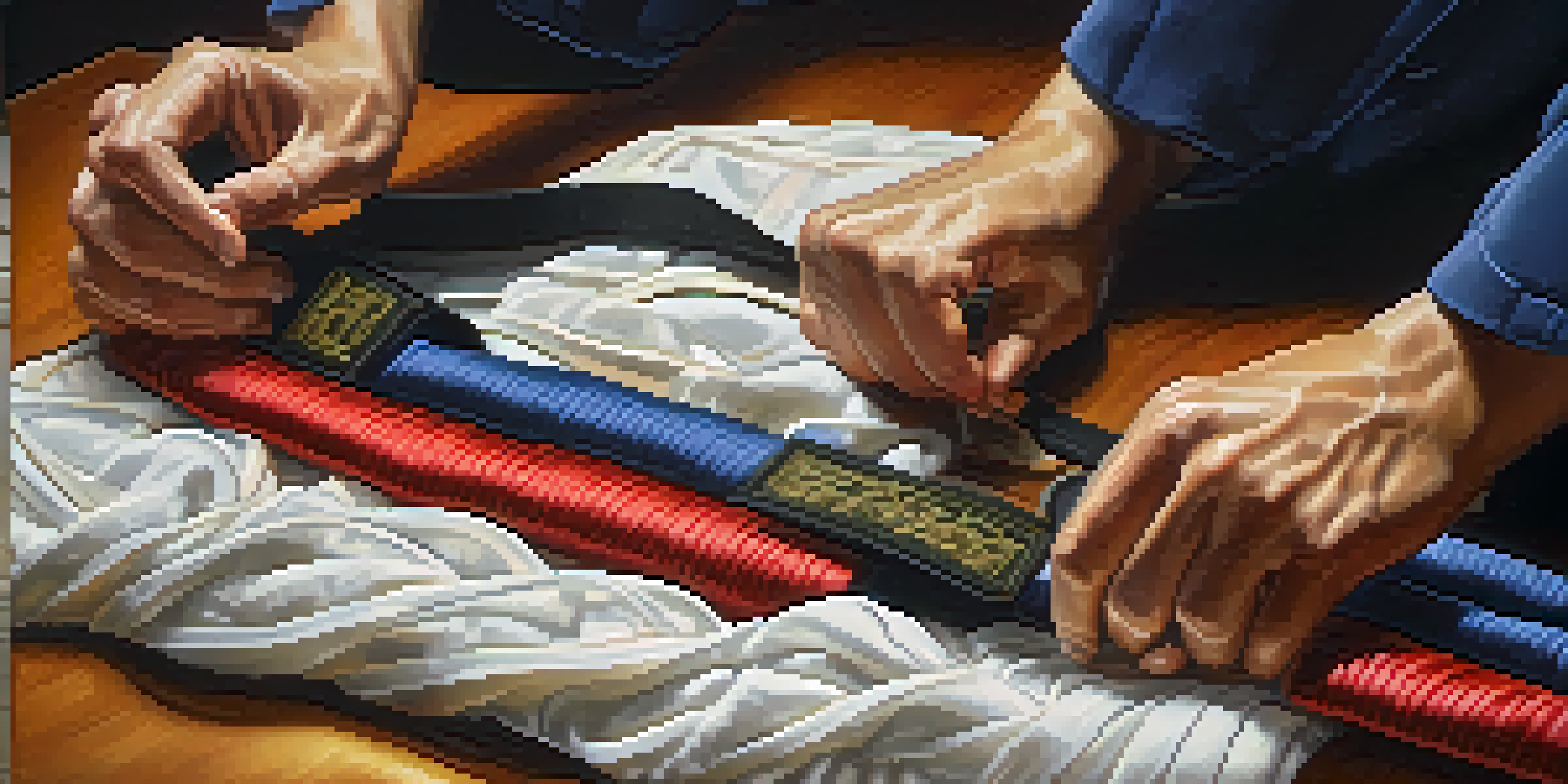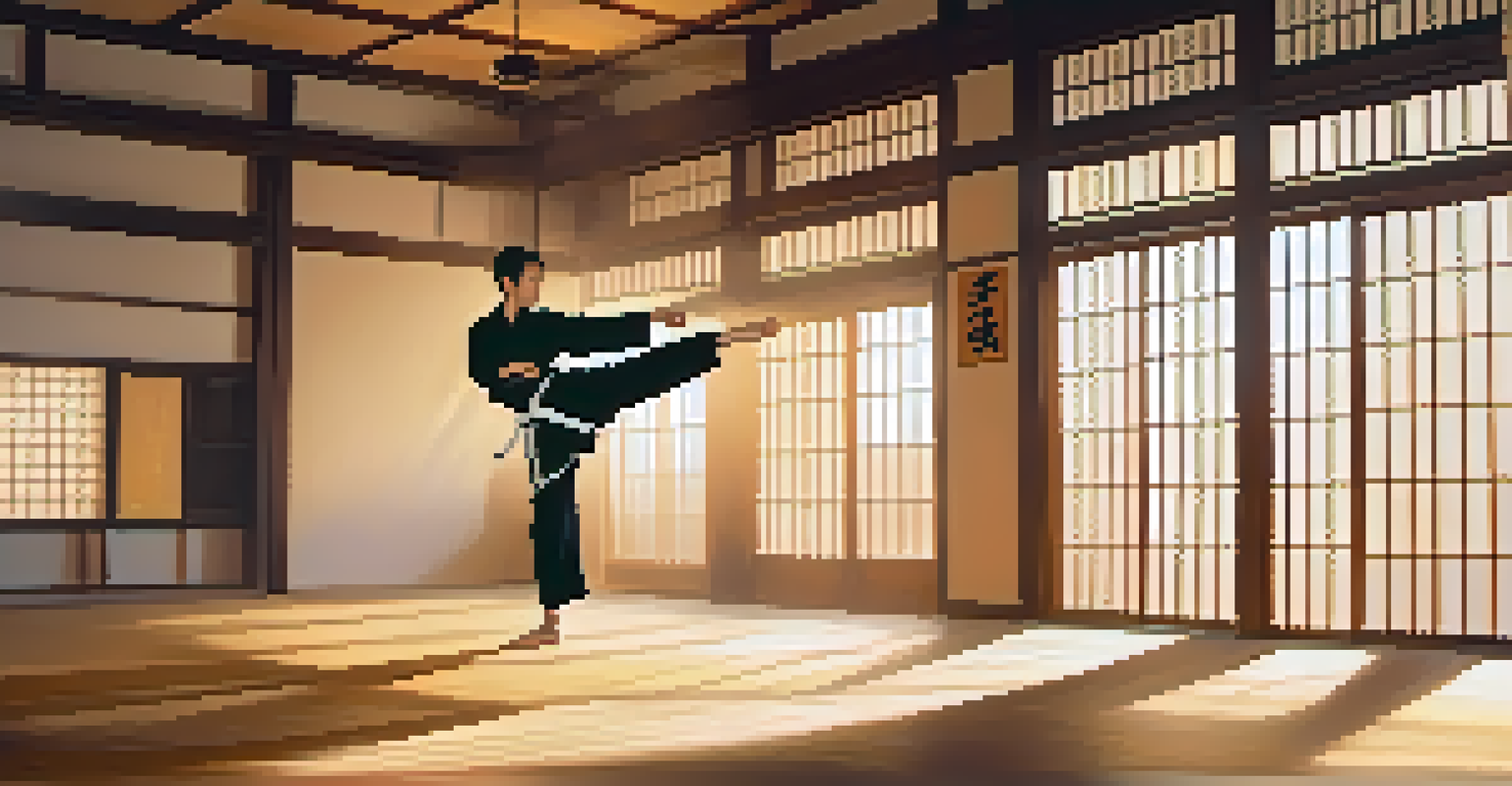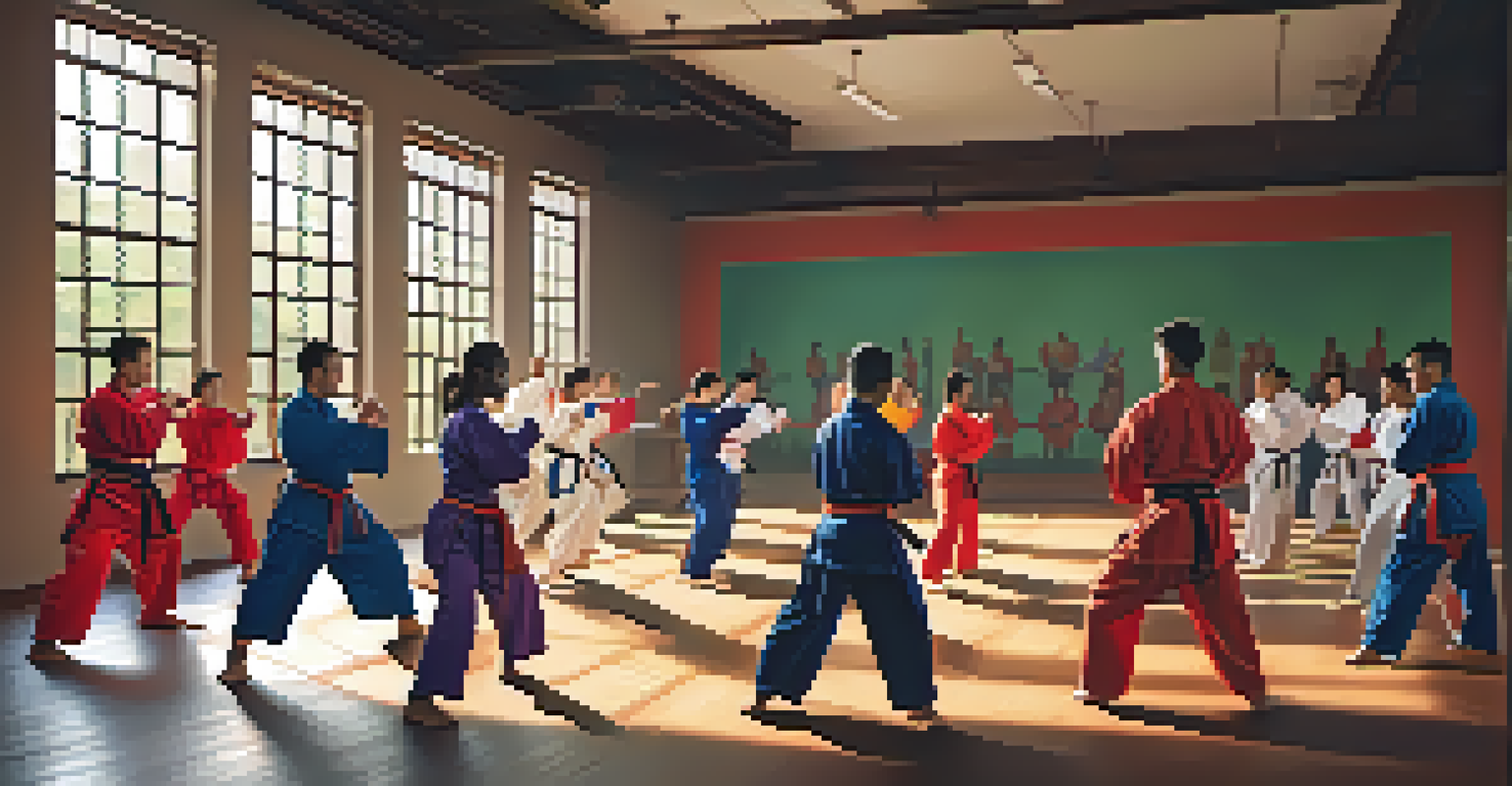How Martial Arts Teach Discipline for Better Work-Life Balance

Martial Arts: A Journey of Self-Discipline
When you step onto the mat, you're not just learning techniques; you're embarking on a journey of self-discipline. Martial arts training requires consistent practice, which teaches you to set goals and work towards them methodically. This process helps instill a sense of responsibility, as you quickly realize that progress depends on your dedication and effort.
Discipline is the bridge between goals and accomplishment.
Through repeated drills and sparring sessions, practitioners learn to push past their limits and persevere in the face of challenges. Each small victory builds confidence and reinforces the idea that discipline is key to achieving success, both on and off the mat. This mindset translates seamlessly into daily life, where maintaining discipline can lead to improved productivity and focus.
Ultimately, martial arts become a mirror reflecting the importance of discipline in all areas of life. Whether you're managing work projects or family commitments, the lessons learned in martial arts can help you create a structured approach to balancing your responsibilities.
The Role of Routine in Martial Arts Training
One of the cornerstones of martial arts is the establishment of a solid routine. Training schedules are often meticulously planned, incorporating warm-ups, techniques, and cool-downs. This structured approach fosters discipline as you learn to prioritize your training, making it a non-negotiable part of your day.

By committing to a routine, you develop habits that promote a better work-life balance. Just as you wouldn’t skip your martial arts class without a good reason, you start treating other commitments with the same level of importance. This shift in mindset helps you allocate time for work, family, and self-care more effectively.
Discipline Shapes Personal Growth
Martial arts training instills self-discipline, teaching practitioners to set and achieve goals both on and off the mat.
Moreover, having a routine instills a sense of predictability in your life. This predictability can reduce stress, as you know what to expect and can plan your day accordingly. With a well-structured routine, you create the space needed for both professional and personal growth.
Mindfulness and Focus in Martial Arts
Martial arts training emphasizes mindfulness, encouraging practitioners to be fully present during their practice. This heightened state of awareness not only enhances performance but also helps you cultivate focus—a skill that's invaluable in both work and personal life. By learning to concentrate on the task at hand, you become more efficient and productive in your daily activities.
The more you sweat in training, the less you bleed in combat.
As you train, you also practice letting go of distractions and negative thoughts, fostering a clearer mindset. This ability to focus can transform how you approach tasks, allowing you to tackle challenges with a calm and collected demeanor. The result? A more balanced life where you can handle the pressures of work and home with grace.
Incorporating mindfulness into your daily routine can lead to reduced anxiety and improved mental clarity. Just as you learn to center yourself in martial arts, you can apply these techniques to manage stressors in your life, ultimately achieving a healthier work-life balance.
Goal Setting: A Martial Arts Framework
Setting goals is a crucial aspect of martial arts, helping practitioners measure their progress and stay motivated. Whether it's mastering a new technique or earning a belt, each goal provides a sense of purpose that drives you forward. This practice of goal setting can be easily adapted to your work and personal life, helping you maintain clarity and focus.
When you establish clear, achievable goals, you create a roadmap for success. This roadmap not only outlines the steps you need to take but also allows for regular reflection on your progress. Celebrating small victories along the way reinforces the importance of discipline, fueling your motivation to continue pushing yourself.
Mindfulness Enhances Focus
Practicing mindfulness in martial arts cultivates focus, enabling individuals to tackle daily challenges with clarity and calmness.
Moreover, the discipline required to achieve these goals extends beyond the dojo. You begin to approach work projects and personal aspirations with the same determination, leading to better results and a more fulfilling life overall. In essence, martial arts teaches you that discipline in goal setting is a powerful tool for achieving balance.
Resilience: Overcoming Challenges in Martial Arts
In martial arts, challenges are part of the journey. Whether it's sparring with a partner or facing a difficult technique, each obstacle teaches you resilience. Learning to overcome these challenges cultivates a mindset that embraces difficulties rather than shying away from them, a valuable lesson for navigating the ups and downs of life.
This resilience helps you develop a stronger work ethic, as you learn that setbacks are merely stepping stones to success. Instead of becoming discouraged by failures, you start viewing them as opportunities to grow and improve. This shift in perspective can significantly enhance your ability to cope with stress and maintain a balanced life.
Ultimately, the resilience gained from martial arts empowers you to tackle life's challenges with confidence. You learn that discipline and perseverance are crucial not only in training but also in managing work-life balance. This newfound strength fosters a sense of stability as you navigate both personal and professional obligations.
Community Support in Martial Arts Training
One of the most rewarding aspects of martial arts is the sense of community it fosters. Training alongside others creates a supportive environment where everyone encourages each other to improve. This camaraderie can be a powerful motivator, helping you stay disciplined and committed to your goals.
Having a support network in martial arts can also translate into your personal life. When you surround yourself with like-minded individuals who share your values, it becomes easier to maintain balance. These connections can provide encouragement during challenging times, reminding you that you're not alone in your journey.
Community Fuels Motivation
The supportive environment of martial arts fosters camaraderie, helping individuals stay disciplined and balanced in their lives.
Moreover, participating in a community often leads to shared experiences, further enhancing your motivation. The friendships formed through martial arts can provide emotional support and accountability, making it easier to juggle work and personal commitments. In essence, the community aspect of martial arts reinforces the idea that discipline flourishes in a supportive environment.
Translating Martial Arts Skills to Everyday Life
The skills learned in martial arts extend far beyond the dojo, influencing various aspects of everyday life. The discipline, focus, and resilience cultivated through training can enhance your ability to manage time effectively and prioritize tasks. This newfound skill set is instrumental in achieving a harmonious work-life balance.
For instance, the ability to remain calm under pressure, honed through sparring, can help you navigate stressful work situations with grace. Rather than feeling overwhelmed, you approach challenges with a clear mind, making it easier to find solutions. This translates into a more productive and balanced work environment.

Ultimately, martial arts equip you with tools that empower you to live a more balanced life. By applying the principles of discipline and focus learned in training, you can create a fulfilling personal and professional life. As you master these skills, you’ll find yourself not just surviving but thriving in every aspect of life.